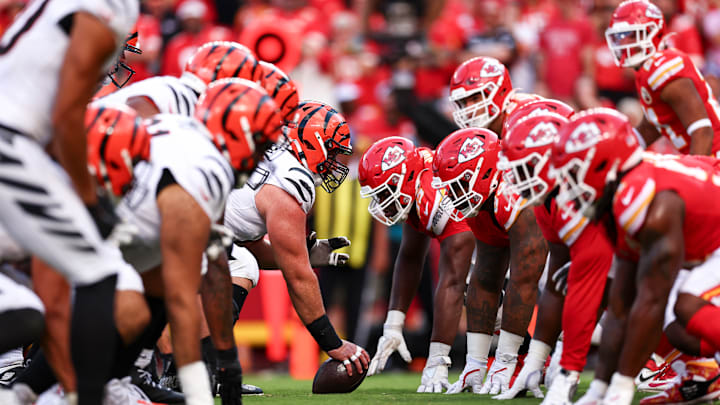Something has been irking me. There is a phrase that has been thrown around this week following Kansas City’s narrow 26-25 win over the Cincinnati Bengals last Sunday.
"Cincinnati is Kansas City’s kryptonite" is a hot take you might have heard. Or maybe "the Bengals defense is like Kryptonite to Patrick Mahomes"—something along those lines.
It’s a phrase that’s been thrown around on X (formerly known as Twitter), and even in the sports media world as well. It sounds nice, but there's just one problem—it's totally flawed.
On the surface, the premise makes sense. Patrick Mahomes is the quarterbacking equivalent of Superman on a football field. But against the Bengals, they’ve been able to make him look decidedly mortal, in a way that no other team has consistently been able to do. Cincinnati's defensive coordinator Lou Anarumo deserves credit for that.
In the DC universe, Kryptonite is the one substance that can stop Superman and other Kryptonians. It weakens them and makes them completely lose their superpowers. It sounds like what happens to Mahomes, right? But there’s some crucial context that’s missing when people use the Kryptonite line, and it is what’s been niggling at me all week.
We can stop with the whole "Bengals as Chiefs' Kryptonite" discussion.
Mahomes and the Chiefs have consistently been able to beat the Bengals.
THANK YOU HARRISON BUTKER 🙌 pic.twitter.com/SFLjkrxgux
— Kansas City Chiefs (@Chiefs) September 15, 2024
People seem to overlook that its the Chiefs that have a three-game winning streak over their rivals, not the other way around. So, can we really say that statement is accurate? I don’t think so.
Do the Bengals play Mahomes and the Chiefs tough? Absolutely. But is Kansas City overpowered by Cincinnati time and time again? Definitely not.
Yes, Joe Burrow, Anarumo, and the Bengals went 3-0 the first three times they played the Chiefs, including a soul-crushing, come-from-behind win in the 2021 AFC Championship game. Since then, however, the Chiefs have reeled off a three-game winning streak of their own over Cincinnati, including a redemption win in the AFC championship game two seasons ago.
The Bengals stopped the Chiefs from reaching a Super Bowl. But since then, they’ve been unable to stop them winning two more, despite having multiple opportunities to do so. That doesn’t sound like Kryptonite to me.
As recently as last Sunday, the Chiefs proved they can outmatch Cincinnati.
I don’t care if Chase was rusty because he skipped training camp and hasn’t been practicing—that’s a Bengals problem, one that is entirely within the organization’s control. I also don’t care if Tee Higgins was out with an injury, or if Cincinnati’s offensive line is ordinary. Again, that’s an issue for Cincinnati to solve.
The Chiefs had problems of their own. Their biggest offseason acquisition in Hollywood Brown is on injured reserve. Their biggest receiving playmaker Travis Kelce had a single catch against Cincy. The team also started and then benched rookie left tackle Kingsley Suamataia.
What did they do? They won anyway.
Last year, the Bengals were missing Joe Burrow when they faced Kansas City, and of course, that’s a big loss. But they still had Ja’Marr Chase, Joe Mixon, Tee Higgins, and Tyler Boyd that day, and they lost to a Chiefs team that only scored one touchdown.
It’s true that Cincinnati has been able to consistently limit the Chiefs, but they haven’t been able to stop them.
Superman can't beat kyrptonite, but Kansas City has shown it’s consistently able to come out on top against the Bengals. Mahomes himself might play to a superhuman level, but this is still a super team on the brink of history.
People in the NFL love to bring up Cincinnati's 'Burrowhead' win in the AFC championship game. But the truth is, as every day goes by, that result gets further and further away in the rearview mirror, and the Chiefs have collected two more Lombardi trophies on the way.
It's time to move on from a result that happened nearly a thousand days ago and think it's going to be a reliable indicator of what's going to happen almost three years later. Is Cincinnati really Kansas City’s Kryptonite? I’m not buying it, and recent history shows the answer is clearly no.
